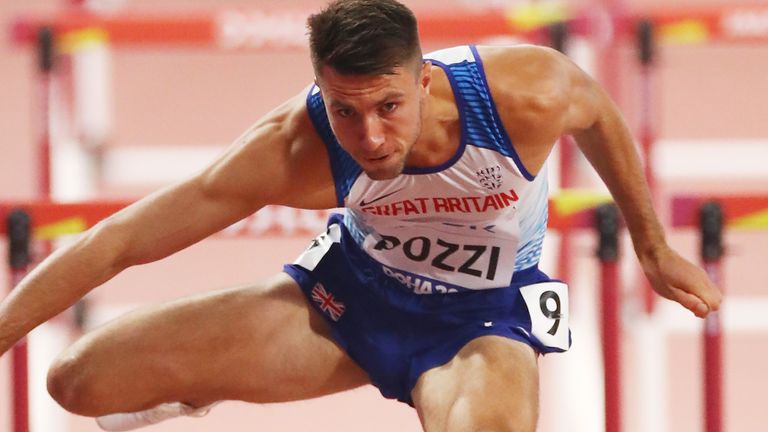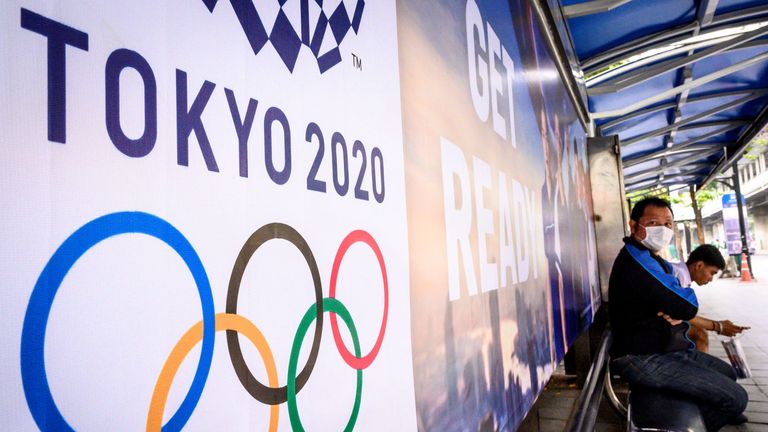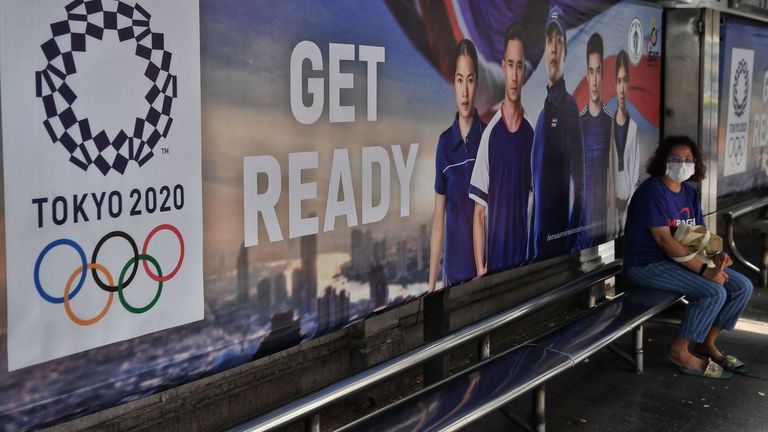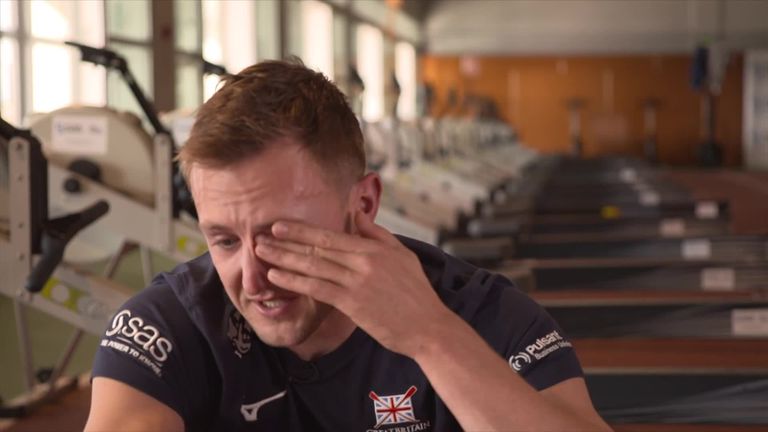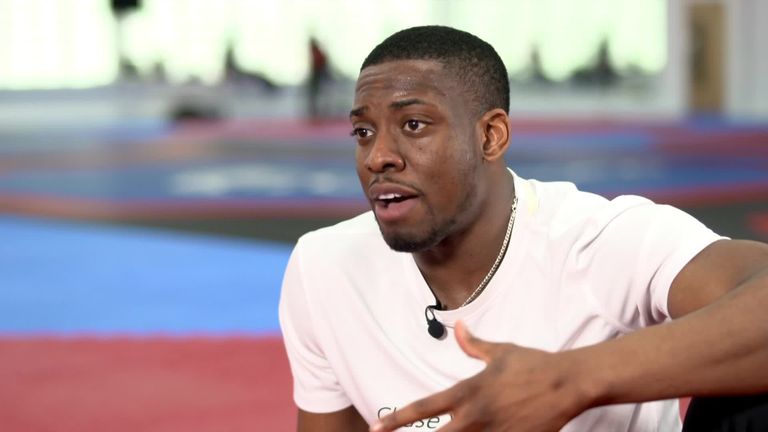Andrew Pozzi Q&A: GB hurdler tells Sky Sports about Olympic uncertainty and life under lockdown
'If you remove the Olympics it's hard to know what lies ahead'
Monday 23 March 2020 13:27, UK
Sprint hurdler Andrew Pozzi made the decision to live and train in Italy with the aim of realising his potential and his dreams. To become an Olympic champion.
Sky Sports Scholar Pozzi has always had the raw talent - quick, dedicated and intelligent - but by his own admission, technical flaws in his sport are the difference between gold and last place.
And so legendary Cuban coach Santiago Antunez, who coached two of the last five Olympic 110m hurdles champions in Anier Garcia in 2000 and Dayron Robles in 2008, agreed to bring Pozzi into his training group - based at the Italian Olympic Committee's high-performance centre in Formio.
- IOC: Olympics decision within four weeks
- Canada won't send athletes to 2020 Olympics
- USA Track and Field calls for Olympics postponement
Antunez is known to be a demanding coach, and over the past 18 months the two have worked tirelessly to give the 27-year-old the chance of winning gold at the Tokyo Olympics.
Now, like many athletes all over the world, Pozzi finds himself not knowing whether the Games will go ahead - or even if they should. His situation is made more complicated by the fact he is living and training in Italy, where the coronavirus pandemic has claimed the most deaths in the world. He has restrictions placed upon his movements and his ability even to buy food from the supermarket. He is also living alone, apart from family and loved ones.
Sky Sports spoke to Andrew about a range of subjects, including his current coping strategies and his view on whether or not the Olympics should be postponed.
Being based in Italy, describe how you train, how you live under the restrictions in the country?
At the moment I have been under national lockdown for two weeks. I am extremely fortunate that I'm one of very few people in the country able to still do their job. The Italian Olympic Committee have enabled a small number of athletes to continue training if they are working for the upcoming Olympic Games.
I get to spend a couple of hours a day training at my base in Formia - behind closed doors and under social distancing rules. It's very quiet at the centre now as most staff have also been ordered to stay at home. The atmosphere is very different, but I'm extremely grateful to be able to continue work and also have some time outside of the house.
Training aside I spend the other 22 hours of the day in my apartment where I live alone and remain isolated. The streets are entirely empty when I do leave the house and so far I stick to the routine of going to the supermarket once a week.
Other than supermarkets and pharmacies nothing else is open and everybody respects the lockdown because we know it's for the safety and well-being of everyone. There is still a community spirit and it's very common to hear the national anthem and people singing collectively from their balconies.
What's the most challenging part of daily living and training?
The isolation is definitely the hardest part of the situation presently. I'm used to being very independent and moving here with a big language barrier has always meant less socialising than when I trained in the UK, but the lack of contact with anyone has become increasingly challenging.
I only have the opportunity to see or speak to people physically for a couple of hours a day and during that time we're training incredibly intensively in a small group and respecting distance so it's a far cry from a normal social activity. It's often difficult when I return from training knowing that I won't have any in-person interaction for almost 24 hours, and if I have a rest day or two then it's considerably longer.
I spend a lot of time talking on the phone with my girlfriend, family and friends, which makes a big positive difference and goes some way to feeling less isolated, but to not even see someone in passing on the street or in a restaurant to say hello to is a challenge.
Have you thought about returning to the UK? Is there any benefit for you?
I have thought about it, and during many changes in the situation here over the last two weeks I've had to reconsider it. In many ways it would be better for me and my family if I returned home, but while the Olympics is still a possibility this year and I'm able to train in Formia with the guidance of my coach then it's not an option I can consider in good conscience.
The Olympics have been the driving force of every decision and move I have made for the last four years and if I am lucky enough to be able to continue training in an environment that's safe for me and those around me then I need to continue despite the challenges.
I moved my whole life to Italy 18 months ago for this opportunity and I am happy to see it through to reach the goal. Most importantly, we have been given a way to do this without causing risk to ourselves and the public around us and I'm thankful for that.
I would not forgive myself for not preparing as best I could for the Olympic Games while they remain scheduled for July 2020.
Given your indoor season was spectacularly good, what is happening with the outdoor season as it stands today?
My training camp to the USA scheduled for April has been cancelled, as have my opening few races, which leaves me currently without any races. It's not a good situation but it is out of my control and the same for all athletes globally at the moment.
The first three Diamond Leagues have been cancelled and nobody knows when the season could realistically get underway. There is a huge amount of uncertainty, so I am focused only on my training as that is what I can control.
It is not easy working without a plan for competition or known preparation for the Olympic Games but my coach is doing an excellent job of managing the situation and has given lots of confidence to me and my training partners that he will handle whatever circumstances we must prepare under and ensure we are ready for competition when it eventually arises.
I have great confidence in my shape and ability to compete this year due to my strong showing indoors and training since. It's disheartening to consider that there might not be a chance to compete fully this season but the circumstances we are facing are much greater than sport and I am happy to accept whatever decisions are made for the safety of everyone.
How confident are you that you will be physically and mentally prepared for the Olympics if they do begin as scheduled in July?
At the moment I am confident in my preparations and my ability to adapt to whatever situation presents itself. I am in great shape physically and mentally very focused. There is the reality, though, that the longer time goes on with increasing disruptions and uncertainty it will become more difficult to imagine an Olympic Games in July.
Right now it's understandable that everyone focuses on the safety and well-being of themselves and those around them, following government advice ahead of preparation for the Olympic Games.
Several athletes and USA Track & Field have called on the IOC to postpone Tokyo 2020. How do you feel about a postponement?
Initially I was devastated at the thought of a postponement, however increasingly it has become incredibly clear that we are dealing with a world health emergency and the priority has to be on safety above all else. I have to be honest and say as an athlete, a cancelled season and Olympics would be a disaster - four years of work and total dedication with nothing to show for it.
Athletics as a sport functions in Olympic cycles and it would pose a minefield of problems with regards to an athlete's ability to earn a living and survive in the sport. Many athletes rely on prize money from competitions, and sponsorship contracts will all centre around the Olympic Games with all almost certainly due to expire and need renewing at the end of 2020, such is the importance of the Olympic cycle in athletics.
If you remove this season and the Olympic Games it's hard to know what lies ahead. As a person - with vulnerable friends, family and loved ones - it's not hard to see that if this Olympics poses a threat to the safety and wellbeing of the world then it is no longer delivering what an Olympics is supposed to, it's not fit for purpose, and a postponement would be a welcomed and an acceptable decision.
How would a postponement benefit athletes?
A postponement would benefit athletes currently unable to prepare fairly and comprehensively for the biggest sporting event in the world. Some are away from their coaches or training facilities and isolating due to COVID-19. It is absolutely imperative that all athletes without fail follow the advice laid out by their government and health organisations to ensure the safety of everyone is prioritised under these desperately difficult circumstances.
A postponement would allow many to do this without the pressure of taking excess risks now in trying to train in ill-advised circumstances. The key concern with a postponement is are you moving the Games to a time frame that is no longer fair to the athletes who have spent their whole careers preparing for an Olympics in 2020, athletes who are later in their career and have been holding on and pouring their souls into this last chance at Olympic glory?
If, and it is a big if, the Olympics could be held safely and fairly then is it not an obligation to hold them as close to the originally scheduled date as possible for those that have planned and dedicated their whole lives around them?
How has the IOC handled the crisis as far as the athlete is concerned? Are they putting the athlete first?
The IOC is undoubtedly in a difficult position and that can't be understated. From the athletes' point of view, the issue has been around what has felt like unhelpful and seemingly contradictory information.
On one hand the message from various governments has been to shut everything down and isolate entirely, and on the other there was the IOC's original message to continue preparing as best you can. "As best you can" meant very different things to athletes in many different countries. Some couldn't leave their houses and others had yet to experience the effects of COVID-19. All sports communicated messages of temporary suspension and postponement but it felt like there was a radio silence with regards to the Olympics from the IOC for a long time.
We're getting more information now after a lot of scrutiny from athletes, however that information is that a decision is still yet to be reached about any potential change to the dates of the Olympic Games. Athletes must continue to wait with grave uncertainty for another four weeks before knowing the fate of the single most important moment in their lives for the last four years.
If a postponement became a reality, how would that affect you in terms of preparation?
The reality depends massively on how much of a postponement there was. If it was a few months then training could be modified with additional rest and recalibration in order to still arrive at the new date in great condition.
If it was longer, then it would really pose big problems for athletes and coaches and, in truth, it's a tough question to answer right now. As previously mentioned many contracts and circumstances - training, living, coaching - are set to end after 2020 for many athletes so an Olympics in a new year would take a lot of new planning.
Realistically an athlete would need at least six weeks of competition before an Olympic Games would be feasible.
On a personal note, you are used to being apart from family and loved ones, but it's quite a different matter when you 'can't see them. How do you cope, how difficult has it been?
It's incredibly difficult, especially during a time when we are all scared for the wellbeing of our loved ones. This virus is an exceptionally serious world health issue and it's incredibly stressful seeing how people's lives are being turned upside down every day by this situation.
I am vigilant about my safety and more importantly respecting the conditions laid out to successfully isolate to ensure the safety of those around me, and I hope everyone else is taking it just as seriously.
We are incredibly lucky to have dedicated health professionals who are giving their lives to keep us safe and while it's hard to be away from loved ones I take confidence that they are doing the right things to stay safe themselves. We know this is the right thing to do and that makes it easier to be apart.
